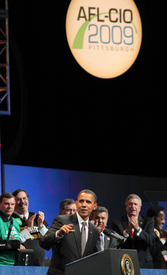
PITTSBURGH- As President Obama walked to the podium to address the AFL-CIO convention it felt like a prolonged earth tremor had begun. Three thousand people jumped to their feet and began almost five solid minutes of applause that only became louder every time the president begged them to be seated.
People cheered, clapped and yelled. Some held back tears. Others, among them retirees, and Black, white, Latino, gay, straight, old and young men and women let it go with tears streaming down their faces. An African American woman delegate from Delaware hugged her white union sister from Maryland who was crying. They then embraced and jumped up and down together in the aisle.
An older white delegate from central Pennsylvania said, while applauding, “My kids were right. Electing this man was the best thing this country ever did.” And the applause just kept going – getting louder every time the president asked then to stop.
A labor movement and a people fired up by a great leader were returning the favor, it seemed, and firing him up. It was labor’s way of saying “thank you” to President Barack Obama, a man they believe has been fighting for them since the day he took office last January, A president they helped elect.
“You know, the White House is pretty nice, but there’s nothing like being back in the House of Labor,” the president finally said as he got the chance to begin his speech. “Being here with all of you is a reminder of what we’re trying to do in Washington and why I’m there in the first place.”
The president tied the success of America to the success of organized labor. “And when organized labor succeeds – that’s when our middle class succeeds And when our middle class succeeds – that’s when America succeeds.” They cheered, chanted and applauded again.
“The fundamental test of our times is whether we will heed this lesson,” Obama said when they quieted down. “Whether we will let America become a nation of the very rich and poor, of the haves and the have nots, or whether we will remain true to the promise of this country and build a future where the success of all of us is built on the success of each of us.”
The president defended the action his administration took to deal with the economic crisis. “We acted boldly and swiftly to pass an unprecedented economic Recovery Act…Because of the Recovery Act, we’re keeping a campaign promise I made by giving 95 percent of working Americans a tax cut – a tax cut that will benefit nearly 5 million families in Pennsylvania. We increased and extended unemployment insurance to 12 million Americans…And we are putting Americans to work across this country rebuilding our crumbling roads, bridges and waterways with the largest investment in our infrastructure since Eisenhower created the Interstate Highway System in the 1950’s.”
The president warned that we cannot be satisfied with just going back to the way things were before the crisis.
“We need to build a new foundation for lasting prosperity by creating the jobs of the future,” he said, by reforming our health care system and by laying down tough rules of the road to protect consumers from abuse.”
The president said he began by reversing and replacing old anti-labor executive orders and policies with “ones that protect your benefits, protect your safety, and protect your rights to organizing and collective bargaining. That’s why the very first bill I signed into law was the Lilly Ledbetter Act to uphold the basic principle of equal pay for equal work. And that’s why I stand behind the Employee Free Choice Act – because if a majority of workers want a union, they should get a union.”
The president said, “the plan I’m proposing will cost around $900 billion over ten years. That’s less than what we’ve spent on the Iraq and Afghanistan wars, and less than the tax cuts for the wealthiest Americans that Congress passed during the previous administration.”
The crowd rose to its feet in applause again.












Comments